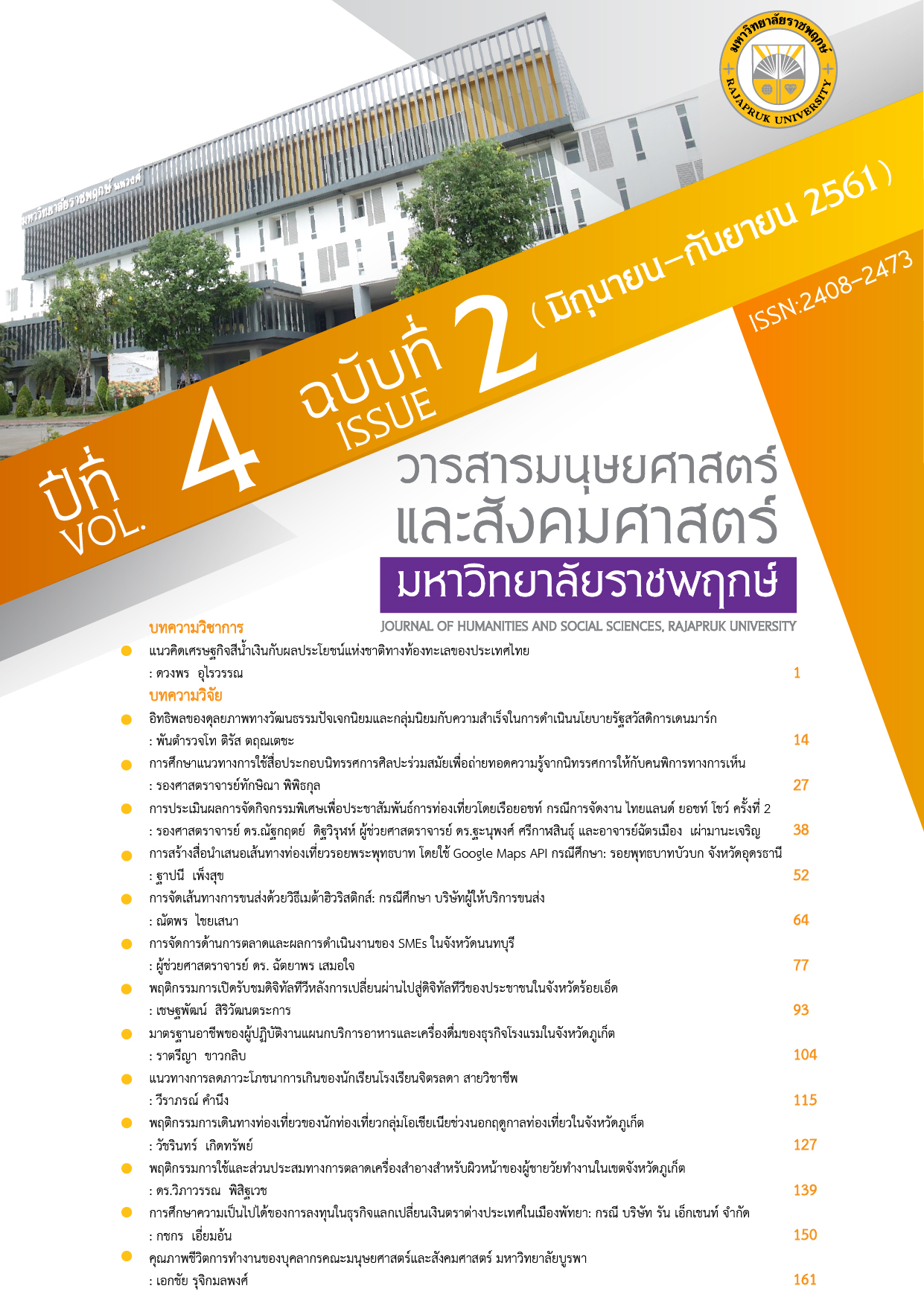Influence of the Balance of Individualism and Collectivism on The Success of Denmark’s Welfare State Policy
Main Article Content
Abstract
This study aimed to find out the factors of the Balance of Individualism and Collectivism that influenced Denmark’s cultural identity on the success of Denmark’s Welfare state policy. Two conceptual frameworks applied in the study were
1) Hofstede’s (1987) cultural dimensions in indicating the level of Individualism and Collectivism in Denmark 2) Public Policy Model by William Dunn (2011), to find out the linkage between Welfare Policy’s value and Cultural Identity factors (Individualism and Collectivism) in Danish Country. The study result revealed that Denmark cultural identity of the Balance of Individualism and Collectivism was a key role in the success of Denmark’s Welfare state policy phenomenon. Furthermore the influence of the Balance of Individualism and Collectivism was one of the prevailing factor in Denmark’s Welfare state Policy.
Article Details
References
ชนิดา จิตตรุทธะ. (2556). วัฒนธรรมองค์การ: องค์กรปกครองส่วนท้องถิ่นไทยและปัจจัยกำหนดความสำเร็จทางวัฒนธรรม. สำนักพิมพ์แห่งจุฬาลงกรณ์มหาวิทยาลัย.
ทักษิณา สุขพัทธี. (2558). อิทธิพลต่อความเชื่อและศรัทธา สู่การสร้างอัตลักษณ์ท้องถิ่นในการออกแบบของที่ระลึกแมวกวักนำโชค มาเนะคิเนะโคะ. วารสารมนุษยศาสตร์และสังคมศาสตร์ มหาวิทยาลัยราชพฤกษ์. 1(1): 17. ค้นเมื่อ 16 กุมภาพันธ์ 2561, จาก https://www.tci-thaijo.org/index.php/rpu/article/view/112134/87390
บุญรัตน์ รัฐบริรักษ์ และ มรุต วันทนากร. (2547). การวิเคราะห์ประเทศกลุ่มสแกนดิเนเวีย: การเมือง เศรษฐกิจ สังคม. ศูนย์ศึกษาการระหว่างประเทศ มหาวิทยาลัยธรรมศาสตร์.
รุ่งทิพย์ สุขกำเนิด. (2556). ส่องความสุขชาวเดนมาร์ก: มองลอดรัฐสวัสดิการเห็นสังคมนิยมโดยวัฒนธรรม. สำนักงานปฏิรูประบบสุขภาพแห่งชาติ.
Campbell, John L. et al. (2006). National Identity and the Varieties of Capitalism: The Danish Experience. McGill- Queen’s University press.
Dunn, Wiliam. (2011). Public Policy Analysis. 5th ed. Pearson Press.
Edwards, Paul K. and Elger, Tony. (1999). The global economy, national states and the regulation of labour.
Hofstede, G. (1987). Culture’s consequences: international differences in work-related values. Abridged ed. Beverly Hills, CA: Sage Publications.
Hofstede-insight. (2018). Danish culture through the lens of the 6-D Model. retrieved on February, 1st 2018, from https://www.hofstede-insights.com/ country-comparison/ denmark/
Jittaruttha, C. (2013). Cultural pyramid with democratization. Publisher of Chulalongkorn University. (in Thai)
Jittaruttha, C. (2013). Organizational Culture: Local Thai Local Governance and Factors Determining Cultural Success. Publisher of Chulalongkorn University. (in Thai)
Lasswell, Harold. (1951). The policy orientation. In Daniel Lerner & Harold D. Lasswell (Eds.), The Policy Sciences. Palo Alto, CA: Stanford University Press.
Minkov, Michael. (2010). Cultures and Organizations, Software of the Mind. McGraw-Hill Education.
Rattaborirak, B. and Wantanakorn, M. (2004). Scandinavian country analysis: Political Economy Society. Center for International Studies Thammasat University. (in Thai)
Sookpatdhee, T. (2015). The Influence of Belief and Faith to build a Local Identityin Souvenir Design for a Lucky Cat Maneki Neko. Journal of Humanities and Social Sciences, Rajapruk University, 1(1): 17. Retrieved on February, 16th 2018, from https://www.tci-thaijo.org/index.php/rpu/article/view/112134/87390
Sukkumnerd, R. (2013). Look the Danish happiness through socialism by culture’s Welfare state. National Health Reform Office. (in Thai)


